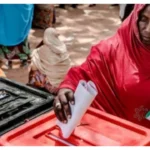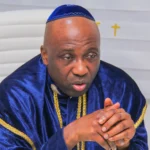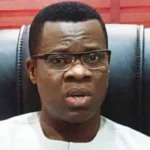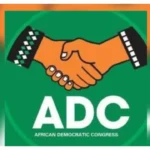Ayo Oyoze Baje
“Technology helps solve the problem of access and quality in education. It can go where good teachers will refuse to go and give students the benefit of the same quality of education that the best schools enjoy.”-Adeboye Oshinaga ( Co-founder Youngsoul
Disrupt Africa — December 2014 )
There must be something unique about the Nigerian DNA. That indomitable Deoxy-ribo-Nucleic-Acid is
creative, innovative, ingenious, resilient, solid and strong, always standing tall like the anthill
in the eye of the global academic storm. If in doubt, consider the recent feats of both Miss Faith Odunsi and Nafisa Aminu. On her part, the former, a 15-year-old girl who represented Nigeria at the Global Mathematics competition, beat the representatives of countries such as the United States of America, USA, the United Kingdom, UK, China and several others to become the World Best. In fact, so smart and confident she was in providing the answers that the judges who were awed by her fast and accurate answers dubbed her “the Calculator”.
Not long after, the 17-year-old Nafisa Abdullah Aminu, a student from Yobe State, Nigeria, emerged as the world’s best in English language skills at the 2025 Teen Eagle Global Finals held in London, United Kingdom. Nafisa, who represented Nigeria through Nigerian Tulip International College (NTIC), Yobe, outperformed over 20,000 students from 69 countries, including many from native English-speaking nations.
Unable to hide his astonishment, world-renowned music star Akon.gushed: “This is not a fluke but confirms that Nigerians are one of the most intelligent people in the world”. That is the heart of the matter. The point being made here is that Nigeria boasts of some of the world’s best brains in virtually all fields of human endeavour.
For instance, the Nigerian team of five girls won the $10,000 Junior Gold Awards at the 2018 Technovation World Challenge. The girls from Regina Pacis Secondary School, Onitsha, Anambra State, Nigeria, represented Nigeria and Africa at the World Technovation Challenge in Silicon Valley in San Francisco, USA. The girls included Jessica Osita,
Promise Nnalue, Nwabuaku Ossai, Adaeze Onuigbo, and
Vivian Okoye. The team, led by Uchenna Onwuamaegbu Ugwu, defeated representatives of other technological giants, including the USA, Spain, Turkey, Uzbekistan and China, to clinch the gold medal.
In a similar technological achievement, back in 2015, Ogbonnaya Bassey’s Solarkobo power generator won the prestigious Young Innovators Prize as the best out of 124 applicants from 34 countries. The event was in Budapest, Hungary, for the Telecommunications World event. But are we, as a nation, making the best use of our astounding creative ingenuity? That is the million Naira question. But the answer, sad to say, is an emphatic “no”! That is where the challenge lies.
Mention the names, Professor Philip Emeagwali, Prof. Gabriel Oyibo, Samuel Achilefu, Babajide Alo, Ayodele Olaiya and Col. Oveimo Ovadje (Retd), and they ring a crisp-clear bell in the hallowed halls of creativity, globally. So are those of Jelani Aliyu, Brino Gilbert, Shehu Saleh Balani, Shaheed Adepoju, Seyi Oyesola and Ndubuisi Ekekwe. For instance, Emeagwali is regarded as one of the founding fathers of the internet as we know it today. For that feat, he was awarded the Gordon Prize, normally reserved for 18 scientists. On his part, Gabriel Oyibo, the Kogi state-born genius who is an engineer, researcher and physicist, broke the thirty-year jinx that Albert Einstein could not solve. He unravelled the Grand Unified Field Theory. That was in 2002. He is an expert whom the United States Aeronautics and Space Administration ( NASA ), based at the Massachusetts Institute of Technology, has immensely benefited from.
It was the ground-breaking development of a set of high-technology cancer visualising goggles made by the Nigeria-born Prof Samuel Achilefu that assisted surgeons to view cancer cells in real-time while operating on their patients. That won him the prestigious St.Louis Award in 2014. And another Nigerian, Jelani Aliyu, who designed the Chevrolet Volt electric car that became General Motors’ leading brand based on its green energy policy now sweeping across the world.
Oh yes! It is good to note that our own Silas Adekunle, a 34-year-old Nigerian engineer, made history as the world’s highest-paid robotics engineer with MekaMon, the first intelligent gaming robot. Can you beat that? Not at all
What with another Nigerian-American, Dr. Osato Osemwengie, known as the “US Drone Builder,” boasting of 4 PhDs and 7 Master’s degrees. The true academic heavyweight is now considered one of the most educated minds on Planet Earth. Salute to this legend, a true Pride of Edo state. Most delighted as we are to be linked with these amazing talents with awesome capabilities, one’s persisting worry is that while the products of their creative ingenuity are positively impacting the techno-economic space in other countries, Nigeria, their fatherland, is being denied such.
It would be recalled that yours truly has been consistently raising concerns about this critical issue through several opinion essays since 2002. First was: ‘ The Challenge of Local Intentions 1 and 2 ‘(Daily Times of October 18 and November 1, 2002 ) followed by ‘ Usually Our Best Brains’ 1 and 2 ( Daily Times, July 18 and August 1, 2003 ). That was before: ‘Turning Brain-drain to Economic Gain ( July 23, 2004). Between then and now, there have been others such as ‘Making the Best Use of Our Best Brains’, ‘Maximising the Potentials of Our Young Inventors and Jelani’s Challenge to Nigeria ‘, yet our political leaders have yet to see the wisdom in one’s clarion call!
Now is the time to start benefiting from Ogbonnaya Bassey’s Solarkobo, a renewable power generator that costs six times less than a normal fuel generator. So we should from the invention of Saheed Adepoju, the co-founder of Encipher Limited, whose INYE-1, a 7-inch resistive screen tablet, offers three hours of battery life and allows HDMI output to HDMI capable devices. And we should also gain from Ndubuisi Ezekwe’s microchips used in invasive surgical robots. He is the Founder of First Atlantic Semiconductors and Microchips Ltd. The list goes on.
While these Nigerian-born inventors are making their marks on the global landscape, there are salient questions in the field of technology, with the abysmally low funding of education. Can we maximise the hidden potentials from our youths with some 13.2 million out-of-school children out there roaming the streets and used as cannon fodder for all manner of insurgency? How do we avoid the embarrassment of the recent technical glitches in JAMB and WAEC results that have brought forth the need to institute sustainable infrastructural development here in the education sector?
To move forward out of the woods, we must take the all-important issue of educational development seriously. A law to make the 26% allocation to education, as recommended by UNESCO, compulsory at both the state and federal government levels, has become necessary. Also, the provision of funds for infrastructural development, recruitment of more teachers, their retraining on information technology and providing the enabling environment for talents to grow, as well as funding of research institutes, and adequate grants for researchers at the
Universities have become the sine qua non of our technological and economic development.
This is yet another clarion call on the government in power, this time as led by President Bola Tinubu, to constitute a bi-annual Summit with our best brains in science and technology as innovators and inventors to fashion the solutions to our myriad of challenges, to benefit Nigerians.







